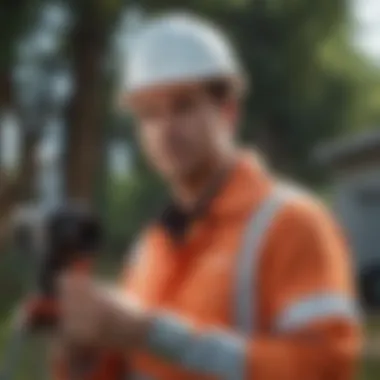Understanding the Home Survey Process for Buyers


Intro
Obtaining a survey on a house is a vital step in the home buying journey. Many people may underestimate its importance, but this process holds significant implications for both financial and personal satisfaction. A proper survey ensures that potential homeowners comprehend the property's condition, boundaries, and any possible issues that could arise.
This article explores the intricacies involved in getting a survey on a house, detailing the types of surveys available, associated costs, and the necessary steps to secure one effectively. By doing so, it aims to equip young professionals, families, and students with valuable knowledge that will empower them during their home-buying experience.
Overview of the Survey Process
When engaging in a property transaction, a survey serves as an essential tool. It provides essential insights into the house's structural integrity and legal parameters. Let's delve into the various aspects of this process.
Definition
A property survey is a detailed assessment conducted by a qualified surveyor to evaluate the condition of a home and its boundaries. This assessment can identify essential factors like structural issues, potential hazards, and any disputes related to property lines.
Key Features
Key features of property surveys include:
- Boundary identification: Ensures that the property's physical limits are clearly marked.
- Condition report: Evaluates the state of the property including structural elements.
- Legal considerations: Addresses any zoning or legal issues that may affect the property.
Purpose and Benefits
The primary purpose of a survey is to provide prospective buyers with a clear perspective on their potential investment. This process helps avoid unexpected repairs resulting from undiscovered problems. Additionally, it can also yield benefits such as:
- Increased negotiation power based on the survey's findings.
- Assurance that the property is suitable for long-term living.
- Peace of mind from having comprehensive knowledge of the investment being made.
Types of Surveys
Understanding the types of surveys is crucial for informed decision-making. Key categories include:
- Homebuyer’s Report: Recommended for conventional properties.
- Building Survey: More comprehensive, ideal for older, unusual, or large homes.
- Condition Report: A basic overview for newer properties, noting urgent issues.
Each type of survey serves a specific purpose, and choosing the right one depends on various situational factors.
Application Process
Securing a property survey involves several steps:
Steps to Apply
- Research local surveyors with good reviews and qualifications.
- Contact and request a quote.
- Schedule a convenient time for the survey to be carried out.
- Review the submitted report upon completion.
Eligibility Requirements
Generally, any homebuyer can request a survey. However, understanding how surveyors work and what they need from you is vital for maximizing the benefits.
Documentation Needed
Gathering relevant documentation can streamline the process. Key documents typically include:
- The property title deed.
- Previous survey reports, if available.
- Any recent renovations or building permits.
Common Mistakes to Avoid
- Failing to choose a suitably qualified surveyor.
- Skipping the survey altogether, leading to unforeseen issues.
Tips for Success
- Be proactive in asking questions and understanding the survey findings.
- Communicate your specific concerns to the surveyor upfront.
Costs and Fees
Financial considerations are critical when obtaining a property survey:
Types of Fees Associated
- Surveyor fees, which can vary significantly based on the type of survey.
- Additional costs for specialized reports, if required.
Comparisons of Costs Across Options
It is prudent to compare costs among multiple surveyors. Usually, a Homebuyer’s Report may cost less than a Building Survey but offers less detail. Judiciously selecting the survey type can prevent overspending while ensuring insights are gained.
A well-conducted survey has the potential to save homeowners thousands in unforeseen repairs and issues.
Prelims to Property Surveys
Buying a home is a crucial milestone for many individuals and families. Before making such a significant financial decision, it is essential to thoroughly assess the property in question. This is where property surveys come into play. Surveys are not merely optional; they are an integral part of the home buying process. They help uncover potential issues and provide insights about the property that may not be visible during a casual inspection.


Definition of a Property Survey
A property survey is a detailed examination of land and property, conducted by a qualified surveyor. It involves a comprehensive assessment of the physical condition of the building and its surroundings. This includes checking for structural integrity, safety hazards, and legal boundaries. Surveys can vary in depth and type, tailored to the specific needs of the buyer. In essence, a property survey serves as a snapshot of the property’s condition at a specific time, offering vital information for informed decision-making.
Why Conduct a Survey?
Conducting a property survey is essential for several reasons:
- Identify Hidden Problems: Issues like dampness, subsidence, or infestations may not be obvious during a viewing. A survey can uncover these hidden concerns.
- Negotiate Better Prices: Understanding the true condition of a property may give buyers leverage in negotiations. If significant repairs are needed, buyers can request price adjustments or concessions.
- Planning for Renovations: For those looking to modify or expand the property, surveys provide crucial data regarding structural limitations and zoning regulations.
- Legal Protection: In some cases, surveys can provide legal documentation to protect the buyer in case of disputes over property boundaries or undisclosed issues.
A property survey empowers buyers with knowledge, reducing uncertainty in the home purchase process.
In summary, the importance of property surveys cannot be overstated. They serve to protect the buyer's investment and ensure that the decision to purchase a home is based on comprehensive information.
Types of Property Surveys
Understanding the different types of property surveys is essential for any prospective homeowner. Each survey type has specific focuses and benefits based on the needs of the buyer. Knowing the distinctions can inform your choice and ensure you get the right survey for your situation. Here’s a closer look at the main types of property surveys, each serving unique purposes to enhance your buying decision.
Homebuyers Survey
The Homebuyers Survey, also known as a condition report, is commonly recommended for those purchasing a home. This survey provides a concise overview of the property's condition, focusing on significant issues that may require attention. Key features of this survey include:
- Identifying Major Problems: It highlights visible defects like structural issues, dampness, and other urgent matters that may affect the safety or value of the property.
- Cost-Effective: Generally more affordable than comprehensive surveys, it offers a quick assessment, making it popular among first-time buyers.
- Non-Intrusive: This survey usually does not involve extensive testing, focusing rather on the visible aspects of the property.
The Homebuyers Survey aids potential homeowners in making educated decisions. It is useful for understanding potential costs associated with repairs and maintenance. Thus, this survey type often serves as a strong initial step before proceeding with more detailed evaluations.
Building Survey
A Building Survey is more detailed than a Homebuyers Survey and is suitable for older homes or properties that require significant appraisal. This survey type offers an extensive examination and analysis of various elements, including:
- Comprehensive Assessment: It includes structural integrity, material conditions, and access points. The surveyor often uses tools for a deeper analysis.
- In-Depth Reporting: The final report usually contains detailed descriptions of issues, potential effects, and repair recommendations.
- Future Planning: This survey is beneficial for buyers considering renovations or significant renovations, as it points out areas needing attention.
Investing in a Building Survey provides peace of mind for informed decision-making and long-term planning. By ensuring a thorough investigation, buyers can anticipate future costs more accurately.
Valuation Survey
A Valuation Survey is distinct, focusing on determining the market value of a property. Primarily utilized by mortgage lenders, it serves to assess whether a property is worth the amount being loaned. Important elements include:
- Market Analysis: Evaluating the property against similar ones in the area.
- Condition Review: Including factors like location, size, and condition to provide a comprehensive valuation.
- Lender's Assurance: This survey protects lenders by ensuring their investment is secure, as it confirms that the property value justifies the mortgage amount.
For buyers, having a Valuation Survey can provide insights into whether they are paying a fair price for the property, which is essential in negotiations.
Environmental Survey
An Environmental Survey evaluates potential environmental hazards that can affect the property and its usage. This survey is essential for understanding environmental risks and regulatory compliance. Notable aspects include:
- Risk Assessment: Determining if the property is at risk for contamination, flooding, or other environmental issues.
- Legal Compliance: Ensuring that there are no violations regarding land use and environmental laws, which can lead to costly repercussions if ignored.
- Future Implications: Understanding environmental factors that might impede property usage or value over time.
For buyers concerned about their environmental footprint or potential risks, this survey type is invaluable for making informed decisions.
In summary, understanding the various types of property surveys allows buyers to choose wisely based on their unique needs. Whether assessing immediate repairs, long-term investments, or environmental risks, each survey type plays a crucial role in the journey to homeownership.
When to Get a Survey
Knowing when to get a property survey is crucial in the home ownership journey. Timing can significantly influence the decisions one makes, whether buying a new home or maintaining an existing one. A timely survey can uncover hidden issues, saving homeowners from future headaches. The following sections will explore pivotal moments when obtaining a survey is beneficial.
Buying a New Home
When purchasing a new home, a property survey is often advisable. It provides a clear view of the property’s condition and unearths potential problems. This is especially important when the house is older or had previous renovations.
Benefits:
- Identify Structural Issues: A survey can highlight problems like foundation cracks or roof leaks.
- Understand Land Boundaries: It clarifies property lines, which is vital for avoiding future disputes with neighbors.
- Informed Negotiations: Survey findings can serve as leverage in negotiations. If issues are found, you might negotiate repairs or a reduced price.
This investment in a survey prior to finalizing the purchase can protect you from unforeseen expenses later.
Considering Renovations
If you plan to renovate or make significant changes to a property, obtaining a survey beforehand is also important. Understanding the current condition of the property can help guide renovation plans.
Considerations:
- Safety Assessments: Ensure that the structure can support the intended renovations.
- Zoning Regulations: A survey will help verify zoning laws that could impact the renovation.
- Budgeting: Knowing what needs addressing allows for better financial planning.
Surveys help in creating a more seamless renovation experience whilst minimizing potential setbacks.
Pre-emptive Measures for Existing Owners
Homeowners should consider a survey for preventive maintenance. As properties age, wear and tear can become noticeable. Being proactive can help catch issues before they escalate.


Advantages:
- Routine Maintenance Planning: A survey highlights areas needing attention, aiding in better maintenance scheduling.
- Preparedness for Real Estate Market: If you plan to sell, a detailed survey can boost property value by ensuring everything is in order.
- Understanding Upgrades Needed: Recognize whether upgrades are necessary for safety or efficiency.
In short, scheduling a property survey at these key moments can reward homeowners with peace of mind and strategic advantage in property management.
The Survey Process
The survey process is a critical aspect of obtaining a clear understanding of a property's condition and value. This process involves several key steps that ensure homeowners or potential buyers can make informed decisions. Understandably, this can become complex, making it essential to navigate each phase effectively. The following sections elucidate important considerations and actions required throughout the survey journey.
Choosing a Qualified Surveyor
Selecting a qualified surveyor is the first and foremost step in the survey process. It is imperative to choose someone with the right credentials and experience. A qualified surveyor holds professional accreditation and is familiar with local regulations and practices.
When looking for a surveyor, consider the following:
- Check for Accreditation: Ensure the surveyor is a member of recognized organizations, such as the Royal Institution of Chartered Surveyors (RICS).
- Evaluate Experience: Look for a surveyor who has extensive experience in the type of survey you need and familiar with the specific area where the property is located.
- Read Reviews: Online reviews and testimonials can provide insight into the surveyor's reputation and client satisfaction.
Communication is also crucial. A good surveyor should be able to explain process details, actions taken, and findings in a way that is easy to comprehend.
Preparing for the Survey
Preparation is essential for ensuring that the survey runs smoothly. Prior to the survey, both the homeowner and the surveyor should agree on important details.
Things to do before the survey include:
- Gather Necessary Documents: Collect property documents such as any previous survey results, land titles, and renovation papers.
- Make Property Accessible: Remove any obstacles to ensure the surveyor can access all areas of the property easily.
- Communicate Concerns: If there are specific areas of concern, it is vital to communicate these to the surveyor beforehand.
Proper preparation can streamline the survey process, ultimately saving time and reducing potential issues.
Conducting the Survey
The actual survey is a detailed and systematic process. During this phase, the surveyor will thoroughly inspect the property. Depending on the type of survey, this could include assessments of structural integrity, systems functionality, and overall safety.
During the survey, the surveyor will typically:
- Inspect the Exterior: This includes checking the roof, walls, windows, and grounds for potential issues.
- Evaluate the Interior: The surveyor will examine rooms for signs of dampness, structural problems, and any renovations that may affect value.
- Utilize Tools and Technology: Modern surveyors often use technology, such as digital imaging or drones, to get a comprehensive view of the property.
Following their assessment, the surveyor will document findings for reporting, including visual evidence when necessary.
Receiving the Survey Report
After the survey is conducted, the next step involves receiving the survey report. This document is crucial as it outlines the findings of the survey. Receiving these results may take several days, but the details contained within can significantly inform decision-making.
Important aspects of the survey report include:
- Condition Assessment: A detailed analysis of the property’s overall condition is provided, including identified issues.
- Recommendations: The surveyor will typically provide suggestions for repairs or further evaluations if problems are found.
- Estimated Costs: Information regarding potential repair costs can be included, giving insight into future financial obligations.
Understanding the report's details is vital, and clarifying any unclear points with the surveyor is recommended.
"A comprehensive survey report can empower potential homeowners to negotiate better terms or reconsider a property purchase entirely."
Navigating the survey process efficiently will fortify the groundwork for a successful property ownership experience. Taking the time to choose the right surveyor, prepare adequately, engage in the survey actively, and understand the findings enables individuals to make rational and informed property decisions.
Costs Associated with Surveys
Understanding the costs associated with property surveys is a vital aspect of the home buying journey. These surveys, while essential, can involve various expenses that potential homeowners need to consider. Knowing the different factors that affect these costs will help in making informed decisions throughout the process.
Factors Influencing Survey Costs
Several elements can influence the cost of obtaining a property survey. Firstly, the type of survey chosen has a direct impact on pricing. A Homebuyers Survey may be less expensive compared to a Building Survey, which is more comprehensive and detailed. Likewise, a Valuation Survey may also vary in cost based on the complexity involved.
Additionally, the size and location of the property greatly affect survey fees. A larger home will typically incur a higher survey charge due to the increased labor and time required to conduct the survey. Properties situated in urban areas may also attract higher costs due to factors such as accessibility and local regulations.
Lastly, the experience and qualifications of the surveyor play a role. Engaging a reputable surveyor with extensive expertise can lead to a higher fee but often results in more reliable findings.
Budgeting for a Survey
When budgeting for a property survey, it is important to take several factors into account. Start by researching different types of surveys and their average costs in your area. This provides a benchmark and helps set realistic expectations regarding expenses.
Consider creating a dedicated budget for the survey. This budget should include not only the survey cost itself but also any potential additional expenses, such as follow-up inspections or repair estimates if issues are discovered. Remember to allocate some funds for potential contingencies; unexpected costs can arise.
In summary, being prepared and adequately budgeting for a survey is critical. This helps to ensure that the process moves smoothly and provides the necessary insights into the property being considered.
"Underestimating survey costs can lead to financial strain, impacting your home buying decisions."
By understanding how survey costs are determined and taking the time to budget accordingly, you will approach the home buying process with greater confidence.
Common Concerns About Surveys


Understanding the concept of property surveys is crucial, as potential homebuyers often have reservations. Addressing these concerns helps clarify the survey process, making it less daunting. Surveys not only ensure that buyers are aware of any existing issues but also assist in determining fair property values. When armed with information, buyers can engage confidently in negotiations and decisions.
Will a Survey Delay My Purchase?
Homebuyers frequently worry that getting a property survey will cause delays in the purchasing process. While it's true that a survey takes time, the potential benefits often outweigh the drawbacks. Scheduling a survey may add a few days or weeks to the buying timeline. However, this time investment is pivotal for uncovering critical information about the property.
Investing in a survey could actually streamline the purchase by revealing necessary repairs or issues that need addressing. In this sense, you could avert surprises later in the buying process.
Moreover, many buyers and sellers negotiate timelines to account for the survey process. Clear communication between all parties can significantly mitigate delays. Thus, while some delay may occur, it is typically not a dealbreaker.
Understanding Survey Findings
Survey findings often provoke confusion. This confusion stems from technical terminology and the overall complexity of the reports. A property survey might uncover various issues such as structural concerns, electrical problems, or environmental hazards, which can lead to significant amendments in your buying strategy.
To truly benefit from the survey results, it's advisable to have a discussion with your surveyor. Understanding the context of the findings will allow you to evaluate their implications. Prioritizing repairs and understanding potential costs will help you make informed decisions.
Developing a checklist may also assist in parsing the information logically. Highlighting critical issues can help you prioritize what must be addressed immediately, compared to matters that can wait. This proactive approach helps avoid crises down the line.
What to Do If Issues Are Found
Discovering issues in a property survey can be unsettling. However, it is essential to view this information pragmatically. First, it's crucial to determine the severity of the issue. Some may be minor inconveniences, while others could be significant, impacting the value and safety of the property.
Upon identifying issues:
- Necessitate Expert Opinions: It might be prudent to consult specialists in the relevant fields to ascertain the depth of the problem. This often requires expert assessments such as structural engineers or electricians.
- Engage in Negotiations: If the survey uncovers significant problems, you may have room to negotiate the sale price or request that the seller addresses the issues before the sale.
- Revise Your Plans: In certain situations, it might be necessary to reconsider your interest in the property entirely. Assess if the potential repairs align with your budget and long-term goals.
Addressing issues found in a survey should not be viewed as a setback. Instead, it represents an opportunity to safeguard your interest and invest in a property that meets your expectations.
Legal Implications of Surveys
Understanding the legal implications of property surveys is crucial for anyone involved in real estate, especially buyers and homeowners. Surveys play a significant role in establishing property boundaries, identifying restrictions, and validating the condition of a property. Failing to recognize these implications could lead to financial and legal complications down the road.
Impact on Property Value
The outcome of a survey can directly affect the value of a property. Generally, a well-conducted survey provides clear information regarding the property's attributes. This information can either support a higher valuation or reveal issues that might necessitate a decrease in price. For example, discovering zoning issues or undisclosed easements can lead a buyer to negotiate for a lower price or even reconsider the purchase entirely.
Furthermore, if a property’s boundaries are found to be misrepresented, it can lead to disputes with neighbors and affect future sales. A thorough survey protects buyers from potential losses by establishing a concrete understanding of what they are purchasing.
A survey can reveal essential insights about your property, potentially saving you from unexpected expenses and disputes in the future.
Disclosure Responsibilities
Property surveys also bring to light the responsibilities of disclosure that sellers have towards buyers. In many regions, sellers are legally bound to disclose any issues that might affect the property’s value or safety. If a survey uncovers significant defects or concerns that the seller was aware of but did not disclose, they could face legal repercussions. This could include financial penalties or, in some instances, the obligation to buy back the property.
Additionally, buyers should be proactive in reviewing survey findings. Understanding what information is available from the survey an can help buyers ensure that they are receiving a complete picture before agreeing to any purchases. Sellers and their agents are required to operate in good faith; thus, clarity from surveys can provide a legal safeguard for buyers against misrepresentation.
In summary, the legal implications surrounding property surveys are broad and impactful. A proper survey can not only validate the investment buyers are making but also clarify obligations for sellers, ensuring a transparent and legally sound transaction.
Recent Trends in Property Surveys
Recent trends in property surveys are shifting in response to various factors, including technological advances and growing environmental awareness. Understanding these trends is essential for homebuyers, real estate professionals, and anyone involved in property management. This section will discuss how these trends benefit stakeholders in the industry and highlight considerations for the future.
Technological Advances
The integration of technology into property surveying has revolutionized the industry. Modern surveyors now use tools such as drones, 3D scanning, and geographic information systems (GIS). These technologies allow for more precise data collection and faster assessments. Drones can quickly capture high-resolution images of a property, and 3D scanning produces detailed three-dimensional models. This not only enhances accuracy but also reduces the time needed for on-site inspections.
Key benefits of these advancements include:
- Improved Accuracy: Advanced tools minimize human error, ensuring that survey results are reliable.
- Cost Efficiency: Reduced labor hours translate to lower costs for consumers.
- Visualizing Data: Technologies like GIS help in visual representations of surveys, aiding in better decision-making for purchasers.
Despite these benefits, it is important to consider the learning curve associated with adopting new technologies. Surveyors must stay updated on the latest tools and techniques, ensuring they can effectively employ them.
Sustainability Considerations
In recent years, the focus on sustainability has gained momentum across various industries, including property surveying. Environmental impact assessments are increasingly becoming a standard part of the surveying process. Homebuyers are more aware of the ecological footprint of their properties, leading to demand for surveys that consider energy efficiency, waste management, and land use.
Key sustainability factors influencing property surveys include:
- Energy Efficiency Ratings: Surveys now often include assessments of a property’s energy consumption, allowing buyers to make informed decisions.
- Land Use Analysis: Evaluating how land is utilized ensures sustainable development and land conservation.
- Renewable Energy Assessments: Homebuyers are interested in properties that can support solar panels and other renewable sources.
Integrating sustainability into property surveys benefits not just the environment but also enhances the value of a property. Buyers are becoming more conscious of the implications of their purchases on not just their immediate environment, but on global issues as well.
As trends evolve, staying informed on technological and sustainability aspects can empower property buyers.
By acknowledging these recent trends, informed choices can be made that will impact property values and the larger environment. This awareness is critical in navigating the complexities of today's real estate landscape.
Closure
In this article, we explored the critical process of obtaining a property survey when purchasing a home. This aspect is vital for making informed decisions. A property survey helps identify potential issues and ensures the value of your investment is accurate. It also serves as a pivotal stage in the home buying journey, allowing buyers to proceed with confidence.
Summary of Key Points
The key takeaways from this article include:
- Importance of Surveys: Surveys protect buyers by revealing problems that may not be visible during a standard viewing.
- Types of Surveys: Understanding the differences among Homebuyers Surveys, Building Surveys, Valuation Surveys, and Environmental Surveys helps in selecting the right one for your needs.
- Timing and Costs: Getting a survey is not only important when buying a new home but also beneficial when considering renovations or for existing property owners. Being aware of factors that influence costs can aid in budgeting adequately.
- Navigating Concerns: Common worries about delays or issues discovered in surveys can be addressed with solid understanding and communication with professionals.
- Legal and Recent Trends: Legal implications and recent technological advancements reflect how the surveying process is evolving.



